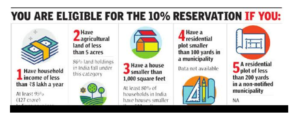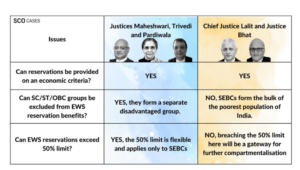Why in the News?
By a majority of 3:2, a five-judge Constitution Bench of the Supreme Court has upheld the validity of the Constitution (103rd) Amendment.

Image Source: Times of India
Key Points:
Judges Verdict on Indira Sawhney judgment:
- EWS quota did not breach the ceiling limit of 50% placed by the Indira Sawhney judgment on reservations.
- State can make special provisions from time to time towards an “all-inclusive egalitarian society”.
- Thus, the EWS quota is an “affirmative action” on the part of the state.

Image Credits: Supreme Court Observer
103rd Constitution Amendment Act:
- The EWS reservation was granted based on the recommendations of a Major Sinhoo commission.
- The Constitution (103rd) Amendment Act 2019 provides up to 10 percent reservation in employment and educational institutions.
- It inserted clauses 15(6) and 16(6) in the Constitution.
- The amendment empowered both the centre and state governments to provide reservations on the basis of economic backwardness.
- Eligibility Criteria:
- People who are not covered under the existing reservations for BCs, SCs, and STs and whose gross annual family income is below Rs 8 lakh per annum.
Challenges to the 103rd Constitution amendment:
- Violates the basic structure of the Constitution: Special protections guaranteed to socially disadvantaged groups are part of the basic structure, and the 103rd Amendment provides special protections on the basis of economic status.
- Violates the SCs 1992 ruling in Indra Sawhney: The ruling upheld the Mandal commission report and capped reservations at 50 percent.
- The court had held that economic backwardness could not be the sole criterion for identifying a backward class.
- Private and unaided educational institutions: They have argued that their fundamental right to practice a trade/ profession is violated when the state compels them to implement its reservation policy.
Additional Information:
|
News Source: The Indian Express
 Profile
Profile Settings
Settings Refer your friends
Refer your friends Sign out
Sign out






